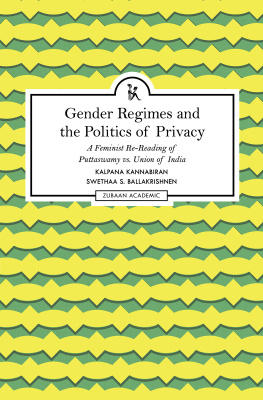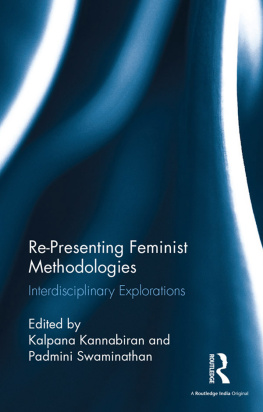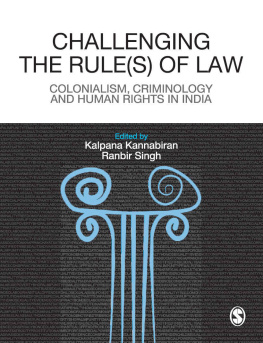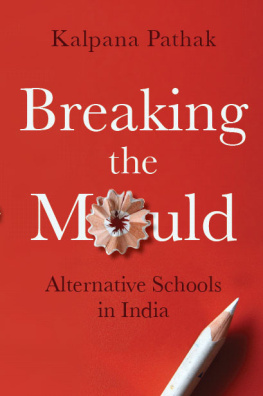Kalpana Kannabiran and Swethaa S. Ballakrishnen - Gender Regimes and the Politics of Privacy
Here you can read online Kalpana Kannabiran and Swethaa S. Ballakrishnen - Gender Regimes and the Politics of Privacy full text of the book (entire story) in english for free. Download pdf and epub, get meaning, cover and reviews about this ebook. year: 2021, publisher: Zubaan Publishers Pvt. Ltd, genre: Politics. Description of the work, (preface) as well as reviews are available. Best literature library LitArk.com created for fans of good reading and offers a wide selection of genres:
Romance novel
Science fiction
Adventure
Detective
Science
History
Home and family
Prose
Art
Politics
Computer
Non-fiction
Religion
Business
Children
Humor
Choose a favorite category and find really read worthwhile books. Enjoy immersion in the world of imagination, feel the emotions of the characters or learn something new for yourself, make an fascinating discovery.
- Book:Gender Regimes and the Politics of Privacy
- Author:
- Publisher:Zubaan Publishers Pvt. Ltd
- Genre:
- Year:2021
- Rating:3 / 5
- Favourites:Add to favourites
- Your mark:
- 60
- 1
- 2
- 3
- 4
- 5
Gender Regimes and the Politics of Privacy: summary, description and annotation
We offer to read an annotation, description, summary or preface (depends on what the author of the book "Gender Regimes and the Politics of Privacy" wrote himself). If you haven't found the necessary information about the book — write in the comments, we will try to find it.
Gender Regimes and the Politics of Privacy — read online for free the complete book (whole text) full work
Below is the text of the book, divided by pages. System saving the place of the last page read, allows you to conveniently read the book "Gender Regimes and the Politics of Privacy" online for free, without having to search again every time where you left off. Put a bookmark, and you can go to the page where you finished reading at any time.
Font size:
Interval:
Bookmark:


Kalpana Kannabiran
Swethaa S. Ballakrishnen


ZUBAAN
128-B Shahpur Jat
First Floor
New Delhi 110049
Email:
Website: www.zubaanbooks.com
First published by Zubaan Publishers Pvt. Ltd 2021
Kalpana Kannabiran and Swethaa S. Ballakrishnen 2021
All rights reserved.
ISBN 978 93 90514 47 2 (paperback)
ISBN 978 93 90514 54 0 (hardback)
ISBN 978 93 90514 52 6 (ebook)
Zubaan is an independent feminist publishing house based in New Delhi, India with a strong academic and general list. It was set up as an imprint of the well known feminist house Kali for Women, and carries forward Kalis tradition of publishing world quality books to high editorial and production standards. Zubaan means tongue, voice, language, speech in Hindustani. Zubaan is a non-profit publisher, working in the areas of the humanities and social sciences, as well as in fiction, general non-fiction, and books for young adults that celebrate difference, diversity and equality for and about the children of India and South Asia under its imprint Young Zubaan.
Ebook conversion by Digiultrabooks Pvt. Ltd
Hello Reader!
This is just a note to let you know that all Zubaan ebooks are completely free of digital rights management (that is, DRM-free), so that you can read them on any of your devices and download them multiple times. We believe that this makes for a more trouble-free and pleasurable reading experience. To be fair to our authors and to enable us to continue publishing and disseminating their work, we appeal to you to buy copies of this ebook rather than share or give it away free. Thank you for your support and cooperation. And happy reading!

This book is, in some sense, a culmination of two decades worth of conversations. Although we only began writing it in earnest over the last two years, many of the chapters are the result of exchanges weve had about the lived political and private lives of the gendered body for much longer: first, in the classroom as student and professor; then, as colleagues with different institutional positionalities; and, over time, as friends with shared camaraderie and as chosen family. The kernels of our arguments are in a plethora of texts and messages over the years with re-reads and commentaries on each others writings, thoughts, and ideas, all of which will never get footnoted or referenced in any objective way. In fact, many of the central themes about the fluidity of categories, interpersonal positionality, and temporality were cumulatively learnt from a range of our own everyday praxis, by being in conversation and relationship with each other and our chosen (and sometimes accidental) others. While the Puttaswamy judgment certainly offered a central node from which this decades-long conversation grew, it is to the versatility and persistence of the relationships these conversations produced that we owe our most humble acknowledgement.
For helping us think through important logics and debates at different stages of writing this manuscript, including reading drafts and responding to pitches of our argument, we are grateful for conversations with and comments from Raj Mohan Tella, Meghaa Ballakrishnen, Peter Goodrich, Sandile Hlatshwayo, Suryapratim Roy, K. Parameshwar, Maithili Pai, Rupali Samuel, Danish Sheikh, Keertana K. Tella and Ramya K. Tella. For research and editing assistance, we are grateful for the time and keen attention of Laura Castillo; and to the librarians at the University of California Irvine School of Law, especially to Jessica Pierucci who helped source many of the comparative materials; to Sreekar Aechuri, who organized the citations, bibliography and case summaries for the entire manuscript; and to Dianna Sahhar and Jeff Latta who made sure we always had all of the academic resources we needed. Tanvi Joshi, our editor at Zubaan, has been a pleasure to work with. We thank her sincerely for her engaged reading of the manuscript and valuable suggestions, and to Nithya V., the Production and Design Editor at Zubaan.
For giving us a chance to document these recursive conversations and build theory around them with resolve, we thank Urvashi Butalia, who not only ran with our initial 30-page pitch with excitement, but also stayed deeply supportive and patient as we worked on the manuscript over the past year. Responding to her feedback and suggestions over the course of the project made this a better manuscript, and Zubaan is a perfect home for a book such as this.
Institutional homes have been central to grounding each of us as we took many flights of intellectual fancy (and actual flights to see each other), and for this luxury we are grateful to the administration and our colleagues at Council for Social Development, Hyderabad and Delhi, NYU Abu Dhabi, and UC-Irvine School of Law. This book also benefitted from being workshopped and presented in various parts and iterations at ICAS-MP meetings, CSD, Asmita Resource Centre for Women, the Law and Society Association meetings, and the Transnational Feminism Long Table at NYU Abu Dhabi. For comments, push back and creative extensions, we thank Eman Abdelhadi, Fawzia Afzal-Khan, May Al Dabbagh, Saba Brelvi, Rachel Brule, Gayatri Gopinath, Vrinda Grover, Ratna Appnender, Sujit Kumar Mishra, Maryam Khan, Nighat Bunny Said Khan, and Raya Lakova.
Families (chosen and otherwise) always get the last lines in acknowledgments such as these for a reason. They do the brutally magnanimous, yet somehow most easily invisible, work of keeping us whole. To our humans across three continents that have done this work (and helped us do ours), we owe a debt of gratitude that we can never repay. Theyve joked rather than be mad about our absentmindedness at dinners and birthdays, fed us and let us be as our silent selves worked in rooms of our own together and apart in Abu Dhabi, California, Madras, and Secunderabad. They have found ways, oftentimes by just existing, to make us see larger pictures so we could be more precise at the more intimate frames. We hope they know we are grateful. But if our work has taught us anything, it is that recall and voicing credit matters. None of this would be worth anything without them. We are so glad they are not just our imagined communities. This work is dedicated to them.
INTRODUCTION

On 24 August 2017, a nine-judge bench in the judgment of the Supreme Court of India in Justice K.S. Puttaswamy & Ors vs. Union of India (Puttaswamy) held that the right to privacy is a fundamental right under the Constitution.
This introduction consists of four parts: the first section attempts to provide a situated account of Indian history and culture as a counterpoint to the extremely reductionist renderings in courtroom conversations that have a bearing on the life and liberty of women, especially those belonging to sexual, religious, caste and ethnic minorities; the second opens out to a cursory view feminist explorations of the state and citizenship in order to suggest a deeper understanding of the relationship between the Constitution and the state, as it constitutes gender regimes, even while affirming rights; the third looks at debates on religion and minorities that provide the context for a gendered elaboration of rights before, in, and beyond
Font size:
Interval:
Bookmark:
Similar books «Gender Regimes and the Politics of Privacy»
Look at similar books to Gender Regimes and the Politics of Privacy. We have selected literature similar in name and meaning in the hope of providing readers with more options to find new, interesting, not yet read works.
Discussion, reviews of the book Gender Regimes and the Politics of Privacy and just readers' own opinions. Leave your comments, write what you think about the work, its meaning or the main characters. Specify what exactly you liked and what you didn't like, and why you think so.











